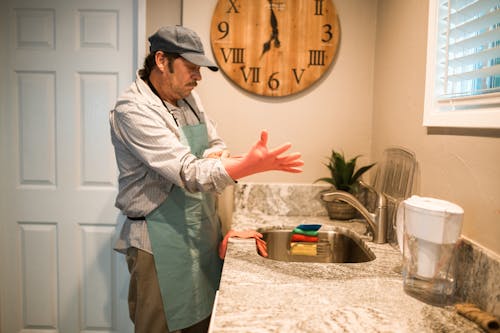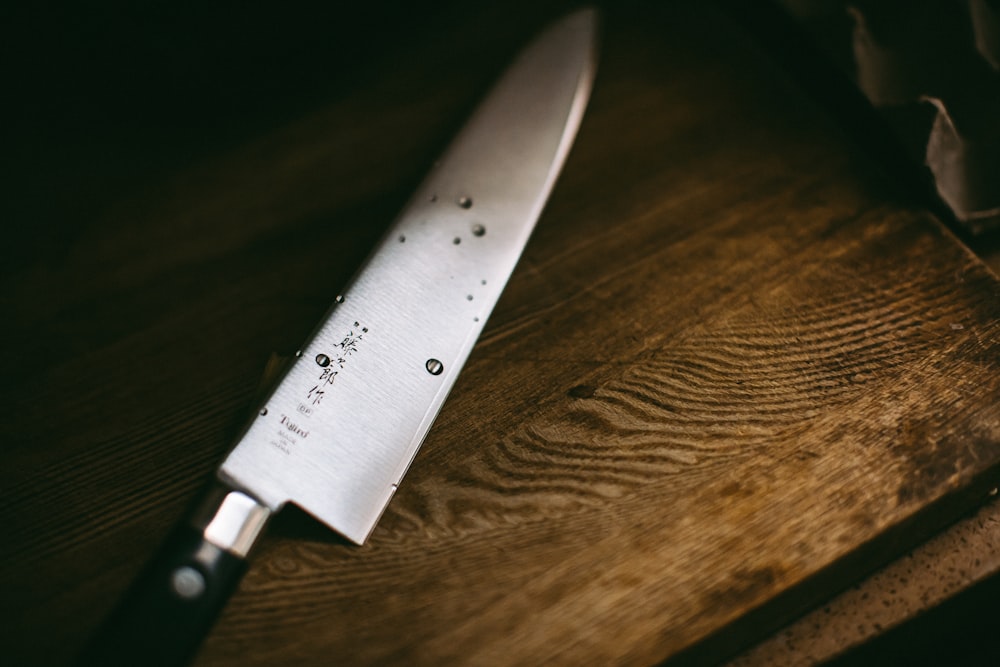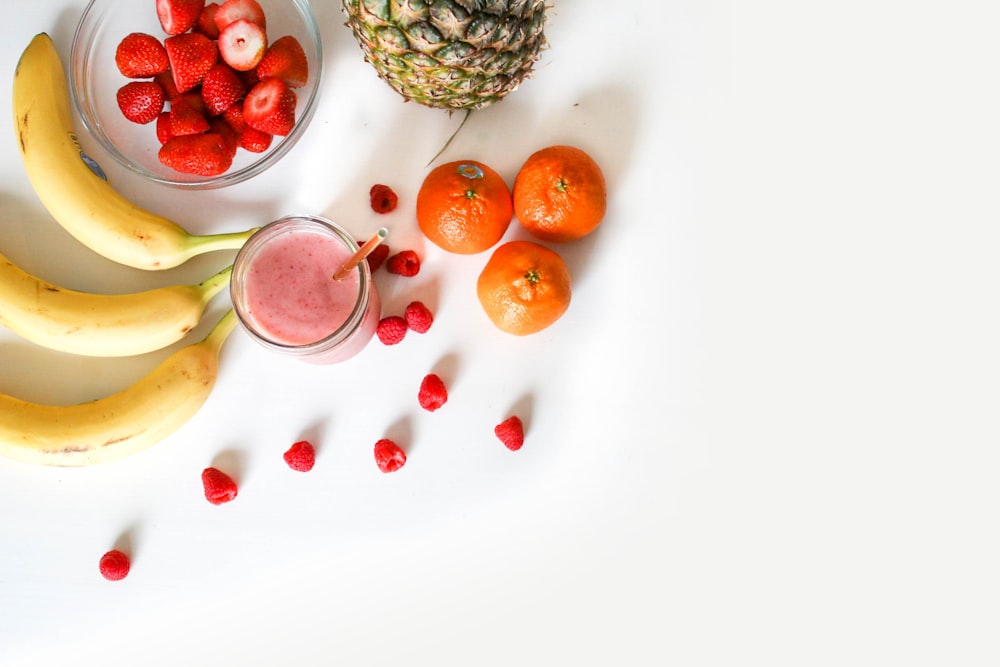Rust is the common enemy of kitchen tools, but it is inevitable, especially among knives. And no one wants to see perfectly sharp blades left to rust. So, the question is this: how to keep knives from rusting?
The key to keeping a knife from rusting is minimizing its moisture exposure. Luckily, there are many proven ways to avoid rust. Read on to see out which prevention method meets your knife needs the best!
Why Do Knives Rust?
Iron oxide is the brown and flaky spots you see growing on metal, otherwise known as rust. It takes place when oxygen and iron get exposed to moisture. And since iron is the main component of the steel present in most kitchen knife blades, rust is common among these kitchen tools.
That’s why you see your kitchen knives rusting when submerged in water or left out in the open for too long.
Also, remember that this applies to stainless steel knives as well. After all, stainless steel is just stain-resistant, and it’s not rust-proof. So, it’s best to think of the material as an additional protective layer for your knife. And this, in turn, allows the blade to be stainless—not rust-less.
Best Methods on How to Keep Knives from Rusting
The best way to handle rusting on knives is by keeping it from happening in the first place. So, stop the rust before it begins by following these prevention methods:
🔪 Oil Your Knives Regularly
As I mentioned earlier, kitchen knives are prone to rust if you keep them in a moist environment. And this also applies when you’ve already dried the blades thoroughly. After all, the kitchen is where much cooking happens, letting the steam make the area humid.
Luckily, oiling your knife is all you need to combat humid and damp environments. But not just any oil will do. You’ll need quality mineral oil to make a protective layer impenetrable to moisture. And this, in turn, protects your knife from rusting regardless of how wet or damp it gets.
Just ensure to apply a thin layer, as overdoing it can cause more harm than good. Either way, this prevention method works with both stainless steel and carbon knives.
🔪 Wash Your Knives by Hand

An easy yet efficient way to prevent your kitchen knives from rusting is by hand washing them. After all, you’re in control. And this lets you cut the blades’ exposure to water, reducing the chances of corrosion.
I recommend washing your knives with liquid dish soap and boiling water after each use. Doing it this way reduces dampness, limiting your knives’ exposure to moisture. Also, remember to rinse your blades with clean water for the best results.
And never forget to dry off the knives with a clean towel thoroughly. After all, the wetter the blade upon storage, the more rust will develop.
🔪 Avoid Using the Dishwasher
Salt and acidic water are common in dishwashers, increasing the corrosion chain. And this can be harmful to most kitchen knives. After all, these components promote iron oxidation, otherwise known as rust.
Also, since most kitchen knives are made from metal, prolonged exposure can be harmful. In short, soaking knives in water for a long time increases the chances of rusting.
So unless the product states that the “knife is safe for the dishwasher,” never use the dishwasher.
🔪 Force Patina

Forcing Patina is an excellent way to make your kitchen knives rust-proof. You can do this by using mustard or vinegar. And here’s how you can do it at home:
- Fill a vessel. Take a container and fill it up with the ingredient of your choice.
- Put the knives in. Submerge the kitchen utensils up to their handles.
- Leave them be. Let the kitchen knife soak in the vinegar or mustard solution for a couple of minutes (5 to 10 minutes), depending on the rust.
- Inspect the blade. If there are any rust stains left, repeat the process if necessary. But if not, wash and dry off the knives.
Although it’s up to you which ingredient to use, I suggest vinegar on medium-sized blades. On the other hand, it’s best to use mustard on larger knives. Either way, these are the most efficient and easiest ways to patina kitchen knives.
And the best part is this method works both on stainless steel and carbon knives!
🔪 Reduce Exposure to Acidity

Prolonged exposure to acidic elements is one of the most common causes of rusting in knives. That’s why it’s best to reduce your blades’ exposure to acidity. And the best way to do this is to limit your use of kitchen knives when cutting oranges, lemons, or limes.
Moreover, I recommend washing the knives immediately after cutting acidic ingredients like grapes. Doing so prevents rusting from happening in the first place.
Meanwhile, if you want to use your knives often for these acidic ingredients, use baking soda on them. After all, this common kitchen item can weaken the reactions. And all you must do is rub a small amount of baking soda on the knife.
But if you don’t want to do all these extra steps, consider using a stainless steel knife. After all, these are less vulnerable to acidic conditions.
🔪 Keep Your Knives Dry and Clean at All Times
Finally, an essential habit everyone with a kitchen knife should develop is keeping the tool dry and clean at all times. And this applies to all kinds of knives. So whether you’re using carbon or stainless steel knives, this should prevent rusting.
It’s best to clean your knives after each use. Doing so keeps your blades in pristine condition. And with dedication and consistency, this should reward your sharpness for years!
Dealing with Rust: How to Remove Rust from Knives
If you still spot rusting on your knives despite following all the prevention methods, don’t fret. After all, there are many ways to remove rust from kitchen knives. Each one helps you remove this flaky substance and make your blades good as new:
Note: You can use any of these in tandem with each other for kitchen knives with severe cases of rusting.
✅ Make Baking Soda Paste
Baking soda is a flexible ingredient that can help you get rid of new or light rust stains. Moreover, it works best for kitchen knives with thin metal.
Here’s how you can get rid of rust on a knife with baking soda:
- Clean the knife. Wipe down the blade to prevent dirt or other debris from interfering in the removal process. I suggest using a cleaning solution instead of water for the best results.
- Make a baking soda paste. Create a rust-removing paste by mixing equal amounts of water and baking soda. Using one to two teaspoons of each component should be enough.
- Spread it. When the paste becomes thick enough, spread it over the rusting parts.
- Let it sit. Leave the paste on the knife for at least an hour.
- Scrub away. After the allotted time, scour the affected areas using a toothbrush. But if you’re dealing with heavily rusted knives, use steel wool or an abrasive sponge instead.
- Remove the paste. Rinse the kitchen knife with plain, warm water and dry it using a clean cloth.
- Don’t forget to lubricate. Finally, to give your knife extra resistance against rust, lubricate it. It’s best to use mineral oil for the best results.
✅ Soak in Vinegar
One of the easiest and most effective ways to remove rust from kitchen knives is by soaking them in vinegar. It’s best to use pure, undiluted white vinegar for the best results. After all, it contains a generous amount of acetic acid, which combats rust.
All you must do is soak your rusting kitchen knives in white vinegar for strictly five minutes. Going beyond this can do more harm than good to your blades. So keep your alarm nearby! Either way, this motion alone should be enough to get rid of rust stains.
However, add the baking soda technique I mentioned earlier to the procedure if you see rust on your knives even after the five-minute mark is over. It should be enough to get rid of even the toughest rust stains.
Otherwise, rinse the white vinegar with lukewarm water, and dry the knives.
✅ Stick Knives in a Potato
An unusual but surprisingly efficient method of removing rust stains on knives is sticking them into potatoes. And this is all thanks to the starch’s high oxalic acid content. It’s enough to wipe away rusting spots, making your kitchen blades good as new.
All you must do is stick the knives into potatoes and leave them be for a couple of hours. And after the set time, wipe down your kitchen tool with mineral oil.
✅ Scrub Off Rust with Steel Wool or Abrasive Sponge
If you’re dealing with newly formed rust spots or lighter ones, you can scrub it off with a ball of wool or sponge. Just make sure you soak the knife in warm, plain water first. Doing this makes it easier to remove the flaky substance. Either way, be careful when using a ball of steel wool or an abrasive sponge, as they can damage your knives.
✅ Lemon + Salt Combo
Lemon and salt are famous for their stain-removing components. And when you combine the abrasiveness of salt with the acidity of a lemon, you get a powerful solution against rust spots. Like the baking soda paste, cover the affected areas with the lemon and salt solution—and wait.
Although it depends on each knife, I suggest letting the lemon and salt mixture sit for at least two hours. Going beyond this can develop more rust stains than before. So pay attention to time.
After letting the solution seep in, scrub the same areas with lemon rind. But if you’re dealing with super rusty knives, use abrasive sponges or steel wools instead. Either way, rinse off the kitchen tool and dry it after you can’t see the flaky substance anymore.
✅ Rub it Off with an Onion
Another unusual yet effective way of removing rust is rubbing an onion on the affected areas. The high sulfenic acid content in onions can break down rust stains like how it breaks you down to tears when slicing into one. And all you must do is slide the knife back and forth while cutting into an onion.
Although tedious, this should let the rust come off by itself. So, be patient, and you’ll be rewarded with sharpness for years to come!
Frequently Asked Questions
Q: What’s the best oil to use to keep my kitchen knife from rusting?
A: Mineral oil is the best conditioning oil for kitchen knives. This oil lasts for a while and maintains its best consistency throughout the years. And it’s higher quality than other oils that become resin-like over time, which becomes ineffective and sticky. So, always choose mineral oil! Just make sure they’re food-grade for the best possible results.
Q: Is it possible to remove rust from a kitchen knife?
A: Removing existing rust on kitchen knives is possible. For instance, submerging the blade in a vinegar solution can help you scrub off the rust easier. It’s that easy!
Q: Why is my new kitchen knife suddenly rusting?
A: Most kitchen knives are made of metals prone to rusting when exposed to excess water or oxygen. So if you notice your newly-bought kitchen knife rusting, relax. It’s natural. And luckily, you can easily prevent it by storing your knives in a cool and dry place. Also, keep these kitchen tools from coming in contact with acidic or salty water. After all, these hasten the corrosion process.
Q: Why does my kitchen knife get brown spots whenever I put it in the dishwasher?
A: Metals present in your knife can start to rust when exposed to water and oxygen. So don’t worry, there’s nothing wrong with your dishwasher. But this proves why you should never put your knife in a dishwasher. After all, not only can your kitchen knives damage the appliance, but the dishwasher can also rust your knife!
Q: Why is my stainless steel kitchen knife rusting?
A: Although most stainless steel blades are rust-resistant, some can still accumulate rust. After all, even if the material has built-in corrosion resistance, it still can get damaged when overexposed to damaging elements. These include harmful chemicals like saline, grease, or overexposure to moisture and heat.
Final Words
There are many ways how to keep knives from rusting. And whether you decide to keep yours clean or build a patina, the methods above are proven—and efficient. Either way, you can easily prevent rusting on knives if you put a little effort into it. So, don’t wait, act fast, and you’ll be rewarded with sharp blades for years—literally!
Also, even if your knives are beyond repair, there are many reliable kitchen knife brands you can try.
